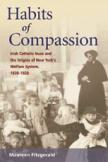Pioneers for the Poor
Univ. of Illinois Press. 304p $50 (hardcover) $25 (paperback)
While reading Maureen Fitzgerald’s doctoral dissertation a few years ago, I was introduced to Sister Mary Irene Fitzgibbon, an Irish-born Sister of Charity whose work on behalf of poor working women in New York City had become legendary. She established the Foundling Asylum in 1869 and supervised it for the next 27 years. The largest institution of its kind in the country, it guaranteed care for all children and women regardless of religion, race or ethnicity, marital status, or ability to pay. When Sister Irene died in August 1896, more than 20,000 people lined the streets of the Upper East Side as a horse-drawn hearse passed by on its way to the local parish church for the funeral Mass. The massive turnout was unprecedented. The people’s admiration for Sister Irene underscored the important work on behalf of the poor that Catholic nuns performed in the 19th century. Regrettably that is a story few people are aware of today. Fitzgerald, associate professor of religious studies and American studies at the College of William and Mary, wants to remedy such historical amnesia by studying the work of Irish Catholic nuns in New York City.
But Habits of Compassion is much more than a history of Irish Catholic nuns. It is a revisionist history that claims that Irish Catholic nuns fundamentally shaped what we have come to call the welfare state.’ Most historians of American women trace the emergence of the welfare state in the early 20th century to the activism of white, Protestant, middle class and elite women. According to Fitzgerald such an interpretation completely overlooks the activism and struggles of poor and working class Catholic and Jewish women. For 20 years before progressive middle-class female reformers emerged on the scene, working-class women, Irish Catholic nuns in particular, championed the idea that the poor should not be punished for their poverty and parents should be helped in raising their children. Progressive female reformers adopted this strategy of family preservation as their own, thereby shaping the welfare system of the 20th century. What historians of American women have overlooked is the significant contribution that working-class women activists made in shaping the nation’s welfare policies. Fitzgerald wants to correct this oversight by placing the work of Catholic nuns in the mainstream of the American reform movement where they belong.
As a result of the Great Famine in Ireland, thousands of poor Irish landed in New York City with little more than the clothes on their back. The response of the Catholic Church, led by Archbishop John Hughes, was mixed. Hughes wanted to build schools in order to save the children. By championing education over charity he unwittingly drove the children of the poor into the hands of Protestant child-savers, whose strategy was to place these children in families in the rural Midwest, where they were to be raised according to the religious, social, political, and economic value systems at the heart of Protestant middle-class culture. The orphan trains that transported these children to towns like Dowagiac, Mich., and Mishawaka, Ind., have become legendary. Thousands of poor Irish Catholic children, as many as 10,000 a year by the 1870’s, were taken from their families. Protestant reformers believed that these poor Irish families had a corrupting influence on the children, the vast majority of whom were not orphans at all.
To save them from the child-savers, Irish Catholic nuns founded numerous institutions in the post-Civil War era. Unlike Protestant reformers, whose strategy was to break up families, the nuns wanted to protect the family by caring for needy children temporarily until they could return home to their own families.
Fitzgerald argues that these children’s charities were successful for two reasons. The first was the financial support of the city and state governments, controlled by Tammany Hall, the Irish political machine that ran New York for almost 80 years. The second was the support of Archbishop Hughes’s successor, John McCloskey, who, unlike Hughes, encouraged the political and religious activism of both religious and laity. A key development in the concept of government aid to poor families was the Children’s Law of 1878, passed by the New York State Legislature. This legislation awarded financial aid to institutions that cared for poor children. Catholic institutions prospered as a result of this legislation. Henceforth, the idea of financial aid to dependent children, or what would become known as welfare, became more accepted.
By the early 20th century, with the professionalization of social work, Catholic nuns had neither the class status nor educational background to claim authority as experts despite having worked in these fields for decades. As a result, they began to lose status and power. In addition, reformers rejected institutionalization as the best means of caring for poor children. It soon became clear to many, including many sisters, that their system of institutionalizing dependent children had run its course. Into the void stepped Protestant middle-class reformers who took up the cause of public aid for dependent children. But as Fitzgerald argues, Irish Catholic nuns laid the foundation on which these reformers built the modern welfare state.
My principal criticism of the book is its organization. At times it is difficult to separate the forest from the trees. This is especially true in the last two chapters where the author traces the transition from the nuns’ activism to the activism of Protestant, middle-class reformers. Another weakness is the lack of a social history of the poor. As a result, the reader never gets a feel for what life was like for those poor Irish Catholic families whom the reformers wanted to help. Nonetheless, Habits of Compassion is an impressive cultural and political history that will undoubtedly revise the standard interpretation of the origins of welfare reform.
This article also appeared in print, under the headline “Pioneers for the Poor,” in the April 3, 2006, issue.








